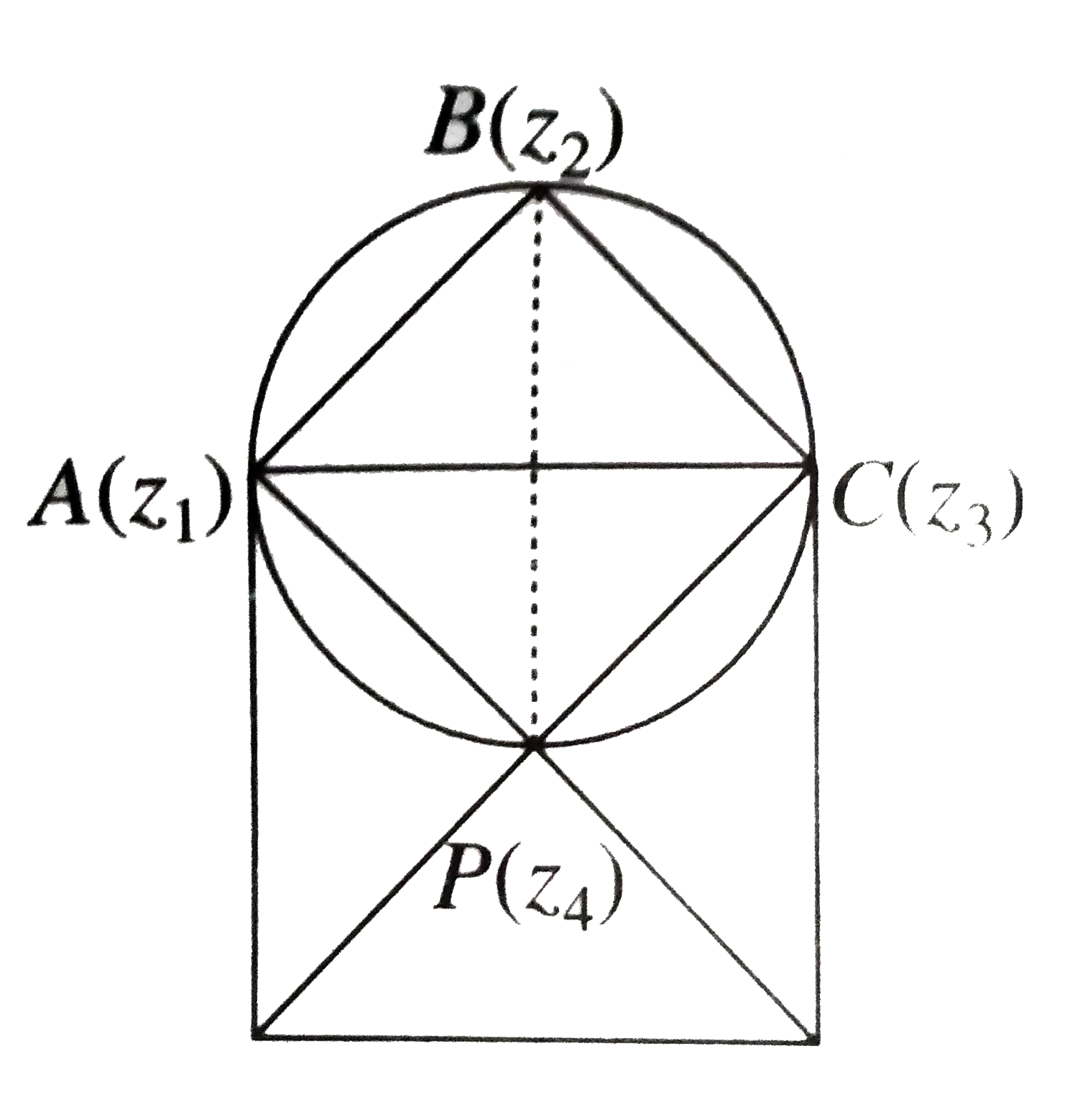Let z1, z2, z3 are the vertices of ΔABC, respectively, such that z3−z2z1−z2 is purely imaginery number. A square on side AC is drawn outwardly. P(z4) is the centre of square, then
|z1−z2|=|z2−z4|
arg(z1−z2z4−z2)+arg(z3−z2z4−z2)=+π2
arg(z1−z2z4−z2)+arg(z3−z2z4−z2)=0
z1, z2, z3 and z4 lie on a circle
The correct Answer is:C, D
(c,d) P is centre of square ⇒AP=PC and ∠APC=π2
∠ABC is also π2.
⇒ABCP is cyclic quadrilateral
⇒A,B,C,P lie on a circle.
⇒ In circl chord, AP=PC
⇒ arc AP= are PC
⇒∠ABP=∠PBC
⇒BP is angular bisector.
Let arg(z1−z2z4−z2)=−α........(i)
⇒arg(z3−z2z4−z2)=α..........(ii)
Add (i) and (ii), arg(z1+z2z4−z2)+arg(z3−z2z4−z2)=0

Topper's Solved these Questions
- COMPLEX NUMBERSBOOK - CENGAGECHAPTER - COMPLEX NUMBERSEXERCISE - Matching Column
1 Videos
- COMPLEX NUMBERSBOOK - CENGAGECHAPTER - COMPLEX NUMBERSEXERCISE - Comprehension
11 Videos
- COMPLEX NUMBERSBOOK - CENGAGECHAPTER - COMPLEX NUMBERSEXERCISE - JEE Advanced Previous Year
14 Videos
- CIRCLESBOOK - CENGAGECHAPTER - CIRCLESEXERCISE - Question Bank
16 Videos
- CONIC SECTIONSBOOK - CENGAGECHAPTER - CONIC SECTIONSEXERCISE - Solved Examples And Exercises
87 Videos
Similar Questions
Knowledge Check
Let A(z1),B(z2),C(z3) be the vertices of an equilateral triangle ABC in the Argand plane, then the number z2−z32z1−z2−z3, is
Apurely realBpurely imaginaryCa complex number with non-zero and imaginary partsDnone of theseLet z1,z2,z3,z4 are distinct complex numbers satisfying |z|=1 and 4z3=3(z1+z2), then |z1−z2| is equal to
A1 or iBior−iC1 or iDior−1
Let A(z1),B(z2),C(z3) be the vertices of an equilateral triangle ABC in the Argand plane, then the number z2−z32z1−z2−z3, is
View SolutionIf 2z1/3z2 is a purely imaginary number, then find the value of |(z1−z2)/(z1+z2)∣.
View SolutionIf z1,z2 are complex number such that 2z13z2 is purely imaginary number, then find ∣∣∣z1−z2z1+z2∣∣∣ .
View SolutionIf z1, and z2 are complex numbers, such that , 3z12z2 is purely imaginary, then find ∣∣∣z1+z2z1−z2∣∣∣
View SolutionLet z1,z2,z3,z4 are distinct complex numbers satisfying |z|=1 and 4z3=3(z1+z2), then |z1−z2| is equal to
View SolutionComplex numbers z1,z2,z3 are the vertices of A,B,C respectively of an equilteral triangle. Show that z21+z22+z23=z1z2+z2z3+z3z1.
View Solution
